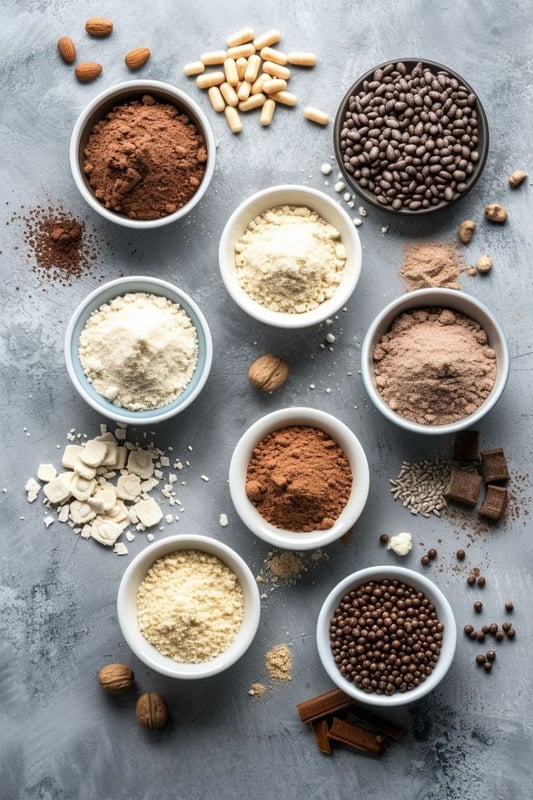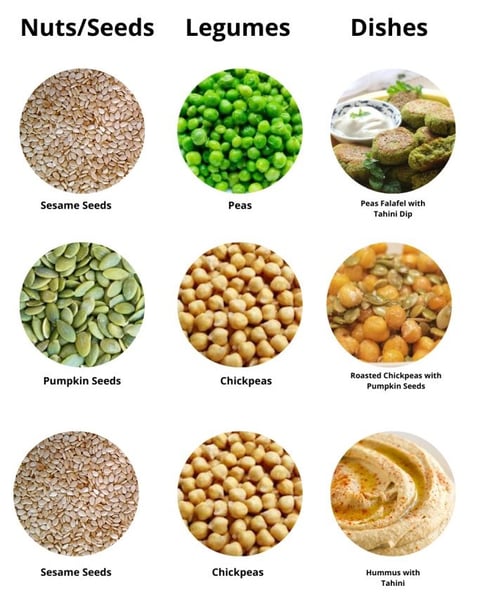Whole Food Protein Sources: A Healthier Alternative to Processed Protein Powders
Discover the benefits of whole food protein sources over processed protein powders. Learn how organ meats, cottage cheese, legumes, and nuts provide superior nutrition, better digestion, and long-lasting energy. Make the switch to a healthier, more balanced diet today!
HEALTH TIPS
2/14/20254 min read
Whole Food Protein Sources: The Transition Away from Processed Protein Powders
Introduction
In the changing times of nutrition and fitness, there is a growing trend towards the consumption of whole food protein sources over processed protein powders. Most health-oriented individuals are opting for nutrient-rich foods like organ meats, cottage cheese, legumes, and nuts, valuing their overall nutritional advantages. This article digs deep into the why of this shift, discusses the advantages of whole food protein sources, and provides real-life tips on how to include them in a healthy diet.


The Benefits of Whole Food Protein Sources
Whole foods provide a more integrated way of consuming protein. They not only give the body high-quality protein but also include a range of other healthy nutrients to benefit the entire body. The following are some of the main benefits of taking whole food protein sources into account:
1. Improved Nutrient Profile
Whole food proteins naturally contain required vitamins, minerals, and antioxidants. They offer a balanced nutritional profile compared to process protein powders that aids muscle building, immune function, and metabolic well-being.
2. Improved Digestion and Gut Well-being
Whole foods that are high in protein provide dietary fiber, probiotics, and natural enzymes that support digestion and the health of a good gut microbiome. For instance, legumes have lots of fiber, and fermented dairy foods such as cottage cheese contain probiotics for good gut health.
3. Sustainable Energy Release
In contrast to quickly absorbed protein powders, whole food proteins take longer to digest, delivering sustained energy levels and minimizing the risk of insulin spikes. This assists in keeping blood sugar levels stable and avoiding energy crashes.
4. Satiety and Weight Control
Whole food proteins are more satiating than processed powders, making people feel fuller for longer. This can be useful for weight control and lowering overall calorie consumption.
Let's take a look at some of the top whole food protein sources and their special benefits:
1. Organ Meats
Organ meats such as liver, heart, and kidney are among the most nutrient-dense foods out there. They contain a good source of protein, iron, vitamin B12, and other nutrients. Liver, for instance, is very rich in vitamin A, which maintains vision and immune function.
2. Cottage Cheese
Cottage cheese is a protein powerhouse with high amounts of slow-digesting casein protein, which aids in muscle recovery. It contains calcium, phosphorus, and probiotics that help in bone health and digestive function.
3. Legumes
Beans, lentils, chickpeas, and peas are great plant protein sources that contain fiber, iron, and antioxidants. They aid in heart health, digestion, and stabilizing blood sugar levels.
4. Nuts and Seeds
Almonds, walnuts, chia seeds, flaxseeds, and hemp seeds are rich in protein, healthy fats, and micronutrients such as magnesium and zinc. They are beneficial for heart health, enhance brain function, and have anti-inflammatory effects.
5. Eggs
Eggs are an entire protein food, with all nine essential amino acids. They are also high in choline, the important nutrient for brain function and metabolism.
6. Fish and Seafood
Salmon, tuna, sardines, and shellfish offer quality protein with omega-3 fatty acids, which are beneficial to cardiovascular health and anti-inflammatory effects.
7. Poultry and Lean Meats
Chicken, turkey, and lean beef are great sources of high-quality protein that offer essential amino acids required for muscle repair and general body function.
Transitioning from protein powders to whole foods containing protein is easy and can be fun. Below are some helpful tips to facilitate the transition:
1. Begin Your Day with Protein
Add eggs, cottage cheese, or a protein smoothie made with seeds and nuts to your breakfast.
2. Choose High-Protein Snacks
Replace processed protein bars with snacks such as Greek yogurt, roasted chickpeas, or nut butter on whole-grain bread.
3. Incorporate Legumes into Meals
Include lentils in soups, incorporate beans into salads, or make hummus a healthy dip.
4. Select High-Grade Animal Proteins
Dietary additions such as grass-fed meat, wild fish, and pasture eggs will ensure nutrient absorption in their best forms.
5. Try Organ Meats
Add liver to pâté dishes, mix it with ground meat dishes, or include heart in stews and stir-fries.
6. Prepare Homemade Protein-Rich Foods
Rather than turning to commercial protein bars, make your own energy bites with nuts, seeds, and dried fruit.
How to Incorporate Whole Food Proteins into Your Diet
Conclusion
The trend towards whole food protein sources is a return to nutrient-dense, unprocessed foods that are conducive to overall health and well-being. While protein powders are convenient, they tend to be missing the broad nutritional value inherent in whole foods. By adding a mix of whole food proteins such as organ meats, cottage cheese, legumes, and nuts, people can reap superior health benefits, better digestion, and increased nutrient absorption. Switching to this way of eating can be a fulfilling move toward a healthier, more balanced lifestyle.
Top Whole Food Protein Sources


The Downside of Processed Protein Powders
Protein powders have been a consistent part of the fitness and bodybuilding cultures because they are convenient and easily absorbed. Nevertheless, their nutritional value, added artificial content, and possible health hazards have been of concern. Some of the most important demerits of processed protein powders are:
1. Artificial Ingredients and Additives
Most protein powders have added artificial sweeteners, emulsifiers, and preservatives that can cause intestinal discomfort and long-term health issues. These ingredients are added to improve taste, texture, and shelf life but produce adverse effects on gut health and overall wellness.
2. Heavy Metal Contamination
Experiments have determined that certain protein powders carry toxic heavy metals including lead, arsenic, and cadmium that can, after prolonged time in the body, cause toxicity. The inclusion of these pollutants indicates that taking protein powders over a period could be risky in terms of health.
3. Shortage of Nutrient Density
Although protein powders offer a concentrated amount of protein, they tend not to contain the vitamins, minerals, fiber, and healthy fats associated with whole foods. Eating a variety of whole food protein sources guarantees that one achieves a wide range of essential nutrients.
Eating Whats
Revitalize your body this winter! Boost energy, support joints, and burn fat naturally with proven remedies for a healthier, more active you!
Wellness
team.eatingwhats@gmail.com
© 2025. All rights reserved.
